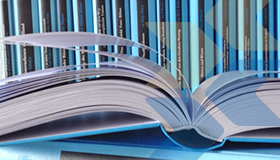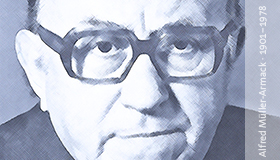| |
History – A short brief story of the alliance
|
65 years Alliance for the Social Market Economy
 Download PDF-Brochure Economy for the People – The Evolution of the Alliance for the Social Market Download PDF-Brochure Economy for the People – The Evolution of the Alliance for the Social Market
Economy in the 1950s

A detailed description of the evolution of the ASM can be found in: Julian Dörr and Maximilian Kutzner, “Außerparlamentarischer Wachhund?” The genesis of the Alliance for the Social Market Economy and its activities for the communication of economic order in Germany in: Economic and Social History quarterly 104 (2017), p.487-524.
The Alliance for the Social Market Economy e.V. (ASM) was founded by the publicist Otto Lautenbach as a branch of the Freiwirtschaftsbund on the January 23, 1953. After his death in 1954, Johann Lang, attorney of the German Genossenschaftsverband, led the alliance. |
 |
1953 |





 |
1953

|
 |
In 1953, the newspaper “Frankfurter Allgemeine” compared the role of the ASM with the role of a watch dog, who barks out loud if things start to slow down economically or go in the wrong direction („ […] wirtschaftlich vielleicht einmal zu langsam vorwärts – oder in eine nicht ganz unbedenkliche Richtung“ FAZ, 23.02.1953, p. 9). Over the course of time, the ASM proved itself as the ‘extra-parliamentary watch dog’.
|







 |
Alexander Rüstow shaped the direction and created the self-image of the ASM from 1955 to 1961 as the chairman of the board from 1955 to 1961. Together with the managing director at that time, Wolfgang Frickhöffer, he turned the ASM into an important economic forum in the early post-war era. In order to stimulate political and economic discussions, the ASM engaged the public with numerous events. The workshops, in which philosophers and practitioners such as Ludwig Erhard, Wilhelm Röpke, Alfred Müller-Armack, Franz Böhm, Günter Schmölders and Karl Schiller participated, became the central platform. |
 |
1955

|












 |
The political and economic design standards were emphasized by the ASM with Rüstow as ‘Savant and Reformer’ (Edith Eucken-Erdsieck). The action program from 1955 vehemently demanded a law against restrictions on competition as an indispensable element of the economic constitution in order to limit the power of companies and lobby associations, and thereby to ensure competition that serves the people. This law was eventually enforced in 1957 after lengthy negotiations.
|
 |
1955

|











|
1961
|
 |
In 1961, Wolfgang Frickhöffer assumed the office of the chairman of the alliance, Alexander Rüstow, who is named honorary chairman. The ASM argues the case for a consistent direction of the economy concerning the principles of the Social Market Economy – meanwhile staying alert to any changes. The ‘ZEIT’ (newspaper) reports on 21.05.1965: The selfish and narrow-minded behavior of stakeholders was attacked in an unusually abrasive manner. The Federal Chancellor admitted in front of the Alliance for the Social Market Economy that lobbyists worry him most.
|












|
Since 1964, the Alexander-Rüstow Plakette is awarded to important people who promote the reinforcement of the Social Market Economy. Ludwig Erhard, Franz Böhm, Karl Schiller, Helmut Schlesinger and Otto Graf Lambsdorff have been awarded this prize.
|
 |
1964

|









 
|
1967
|
 |
The Alliance for the Social Market Economy has critically monitored the political course of the Federal Government for many years. Hence, it opposed the law for the support of the stability and growth of the economy (Magisches Viereck). It requested the Federal Government to abolish the goal of growth from the law because growth is the result of a market economy but not its goal. The overall governance which supports quantitative growth goals, shows tendencies towards tends to dirigisme.
|









 |
In 1978, the alliance celebrates its 25th anniversary. The “Frankfurter Allgemeine” newspaper acknowledges it as the market-economy-oriented conscience. Thus, the ASM has proposed a set of specific improvement suggestions: restructuring measures for financial and social policies, an alternative program for the governmental declaration from December 1976 and a memorandum for the unemployment in the summer of 1977.
|
 |
1978

|









 |
In 1991, Wolfgang Frickhöffer passes away. He had decisive influence on the ASM during his tenure as chairman. On his 70th birthday in the same year, the “FAZ” newspaper concludes that to describe the alliance and its goals and means as well as its organization and power is simple: it consists of Wolfgang Frickhöffer.
Joachim Starbatty is elected as the new chairman in November 1991. The ASM’s office is moved from Heidelberg to Tübingen in 1993. |
 |
1991

|












|
Other new projects are the conception and implementation of the MACRO simulation game in 1999, the intensification of tasks within working groups and the successful establishment of the series ‘Market-Economy based Reform Policies’
|
 |
1995
.
|







 |
2001
  
  
  |
 |
The Alexander-Rüstow Plakette is also awarded in the new millennium: 2001 to Kurt Biedenkopf, 2004 to Bernhard Vogel and Hans Willgerodt, 2011 to Horst Köhler, 2013 to Paul Kirchhof, 2015 to Reinhard Kardinal Marx and lastly in 2018 to Federal Chancellor Angela Merkel. |













 |
In November 2014, Joachim Starbatty resigns from his position as chairman of the Alliance for the Social Market Economy and Nils Goldschmidt is declared his successor. The ‘Süddeutsche’ newspaper writes A changing of the guard for the watch dog.
|
 |
2014

|









|
2016

|
 |
In the honor of his various efforts to keep the ideas of the Social Market Economy vivid and to constantly maintain its significance for our society, Franz Schoser is awarded the Alfred Müller-Armack Verdienstmedaille by the ASM. He is followed by Walter Oswalt and Rolf H. Hasse in 2018.
|







 |
In 2017, the ASM begins its series of events “Lectures about the Social Market Economy”. Every year a researcher is invited and honored. The lectures serve as a base for discussions concerning current developments and conceptional questions about the Social Market Economy. The first lecturer of the new series was Lars P. Feld, director of the Walter Eucken Institute. He was followed by the leading Federal Constitutional Judge Udo Di Fabio in 2018. |
 |
2017

|










|
|
|
 |






















